ホーソーンの「柘榴の種」(上) "The Pomegranate-Seeds" by Nathaniel Hawthorne [Marginalia 余白に]
記事「六粒の柘榴の種――母と娘のはなし(デーメテールとペルセポネ) "The Six Pomegranate Seeds" by Mary MacGregor (1910)」で20世紀初頭に子供向けに書かれたペルセポネの神話を書き出しましたが、アメリカのホーソーンがその半世紀前に子供たちのために書いた「柘榴の種 The Pomegrate-Seeds」も書き写しておきます。
テクストは、A Wonder-Book for Girls and Boys (1852)の続篇として出版された Tanglewood Tales (1853) 。
20世紀のホーソーン全集、オハイオ州立大学の Centenary Edition では第7巻に合わせて収められています(A Wonder-Book はpp. 1-171、Tanglewood Tales はpp. 173-368)。
オハイオ版は、依拠したテクストはもちろん原稿("The copy-text for the present edition is, of course, the manuscript, which alone has authority for the accidentals")と記しているので、原稿と初版テクストにひどく異同があったらめんどうだな、と思ったのですけれど、それほどたいした違いはないみたい。でも、ちなみに "accidentals" というのは、なぜか英和の辞書にその意味で載っていないけれども textual criticism ないし本文校訂の用語で、書き手の意味にとって本質的でない特徴です(ちゃんとOED では確認しました―― accidental の名詞のd で、 "Textual Criticism. Applied to any feature that is non-essential to the author's meaning." 用例は17世紀からあります)。これに対して意味に関わる異同は "substantive variants" と呼ぶのですけれど、なぜかこれも英和辞典にはない、どころかOED にもはっきりテクスト批評の用語とは書いてないみたいです。
オハイオ大学版が初版の "substantive variants" として、原稿と比較のうえで原稿を採用して初版のほうをしりぞけたのは3つあります。
初版 apron full 原稿 apronful
初版 she quite forget 原稿 she quite forgot
初版 as she if she were to stay 原稿 as if she were to stay
下のふたつは実のところ誤植とわかる間違い。最初のは、プロセルピーナがエンネの野原で妖精たちに語ることばのなかで、エプロンいっぱいに花を摘んでくるからここで待ってて――"But do you wait for me here, and I will run and gather my apronful of flowers, and be back again [. . .]"――と言うところ。集めるのは(つまり動詞 gather の目的語は)花で、エプロンではないということで apronful が正しかろうと我々の目にも映ります。でもむかしはナンタラフルということば(代表的なのは spoonful)って、分かち書きしたり、1語になっても-fullだったりもするので、見た目よりはあいまいです。
原稿と初版が違っていて、初版のほうをそのまま採用している異同もありました(目につくのは naiad とか faun とか satyr が原稿では大文字になっている箇所があるのだけれど、統一させたみた。
それから、原稿に誤字がある(w)――ceiling を cieling と書き間違えているとか、branches を brances と脱字で書いているとか――のとかは初版で直したほうを当然採用。原稿で落ちている引用符を初版が踏襲してしまっているのをセンテナリー版が直した箇所もあります。
いろいろ見ると細かいです。細かすぎ。ということで、下のテクストはセンテナリー版の編集を基本尊重した初版テクストです。コンマとかの細かい異同は目を皿のようにしないとわからないところもあるので、気がついた時点で直していきます。(以上、まえおき)
(あれこれ書いてたら50000字制限にくりかえし引っかかってしまったので三分割しますw)
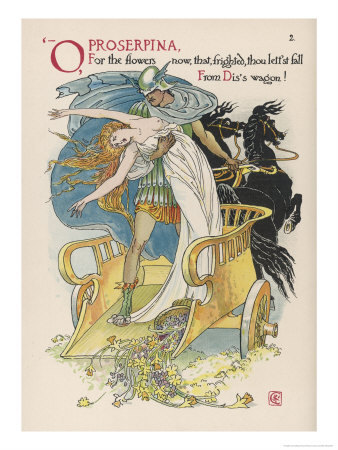
Walter Crane, Flowers from Shakespeare's Garden: A Posy from the Plays Illustrated in 40 Colour Plates by Walter Crane (London: Cassell, 1906)
THE POMEGRANATE SEEDS.
Nathaniel Hawthorne
Mother Ceres was exceedingly fond of her daughter Proserpina, and seldom let her go alone into the fields. But, just at the time when my story begins, the good lady was very busy, because she had the care of the wheat, and the Indian corn, and the rye and barley and, in short, of the crops of every kind, all over the earth; and as the season had thus far been uncommonly backward, it was necessary to make the harvest ripen more speedily than usual. So she put on her turban, made of poppies (a kind of flower which she was always noted for wearing), and got into her car drawn by a pair of winged dragons, and was just ready to set off.
"Dear mother," said Proserpina, "I shall be very lonely while you are away. May I not run down to the shore, and ask some of the sea nymphs to come up out of the waves and play with me?"
"Yes, child," answered Mother Ceres. "The sea nymphs are good creatures, and will never lead you into any harm. But you must take care not to stray away from them, nor go wandering about the fields by yourself. Young girls, without their mothers to take care of them, are very apt to get into mischief."
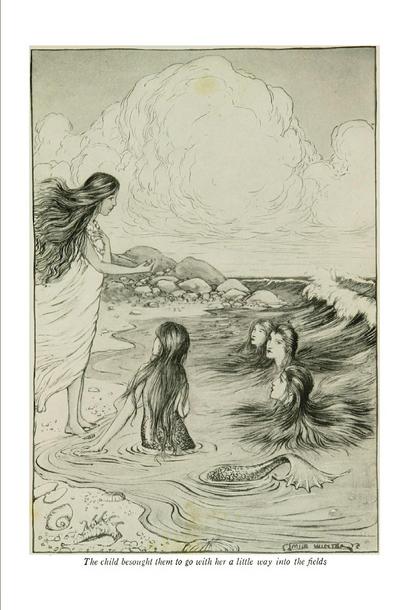
Illustration by Milo Winter. Tanglewood Tales. Chicago: Rand McNally, 1913.
The child promised to be as prudent as if she were a grown-up woman; and, by the time the winged dragons had whirled the car out of sight, she was already on the shore, calling to the sea nymphs to come and play with her. They knew Proserpina's voice, and were not long in showing their glistening faces and sea-green hair above the water, at the bottom of which was their home. They brought along with them a great many beautiful shells; and sitting down on the moist sand, where the surf wave broke over them, they busied themselves in making a necklace, which they hung round Proserpina's neck. By way of showing her gratitude, the child besought them to go with her a little way into the fields, so that they might gather abundance of flowers, with which she would make each of her kind playmates a wreath.
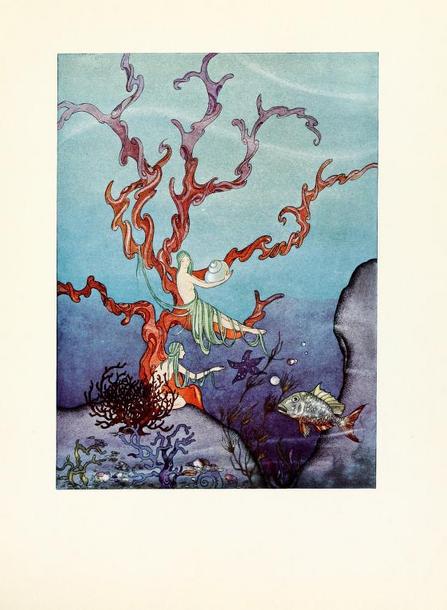
Illustration by Virginia Frances Sterrett. Tanglewood Tales. Philadelphia: Penn Publishing, 1921.
"O no, dear Proserpina," cried the sea nymphs; "we dare not go with you upon the dry land. We are apt to grow faint, unless at every breath we can snuff up the salt breeze of the ocean. And don't you see how careful we are to let the surf wave break over us every moment or two, so as to keep ourselves comfortably moist? If it were not for that, we should look like bunches of uprooted seaweed dried in the sun.
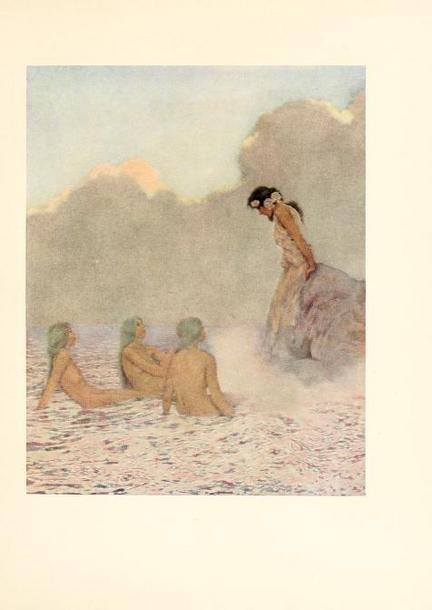
Illustration by Maxfield Parrish. A Wonder Book and Tanglewood Tales for Girls and Boys. New York: Duffield, 1910.
"It is a great pity," said Proserpina. "But do you wait for me here, and I will run and gather my apronful [apron full] of flowers, and be back again before the surf wave has broken ten times over you. I long to make you some wreaths that shall be as lovely as this necklace of many colored shells."
"We will wait, then," answered the sea nymphs. "But while you are gone, we may as well lie down on a bank of soft sponge under the water. The air to-day is a little too dry for our comfort.
But we will pop up our heads every few minutes to see if you are coming."
The young Proserpina ran quickly to a spot where, only the day before, she had seen a great many flowers. These, however, were now a little past their bloom; and wishing to give her friends the freshest and loveliest blossoms, she strayed farther into the fields, and found some that made her scream with delight. Never had she met with such exquisite flowers before--violets so large and fragrant--roses with so rich and delicate a blush--such superb hyacinths and such aromatic pinks--and many others, some of which seemed to be of new shapes and colors. Two or three times, moreover, she could not help thinking that a tuft of most splendid flowers had suddenly sprouted out of the earth before her very eyes, as if on purpose to tempt her a few steps farther. Proserpina's apron was soon filled, and brimming over with delightful blossoms. She was on the point of turning back in order to rejoin the sea nymphs, and sit with them on the moist sands, all twining wreaths together. But, a little farther on, what should she behold? It was a large shrub, completely covered with the most magnificent flowers in the world.
"The darlings!" cried Proserpina; and then she thought to herself, "I was looking at that spot only a moment ago. How strange it is that I did not see the flowers!"
The nearer she approached the shrub, the more attractive it looked, until she came quite close to it; and then, although its beauty was richer than words can tell, she hardly knew whether to like it or not. It bore above a hundred flowers of the most brilliant hues, and each different from the others, but all having a kind of resemblance among themselves, which showed them to be sister blossoms. But there was a deep, glossy luster on the leaves of the shrub, and on the petals of the flowers, that made Proserpina doubt whether they might not be poisonous. To tell you the truth, foolish as it may seem, she was half inclined to turn round and run away.
"What a silly child I am!" thought she, taking courage. "It is really the most beautiful shrub that ever sprang out of the earth. I will pull it up by the roots, and carry it home, and plant it in my mother's garden."
Holding up her apron full of flowers with her left hand, Proserpina seized the large shrub with the other, and pulled, and pulled, but was hardly able to loosen the soil about its roots. What a deep-rooted plant it was! Again the girl pulled with all her might, and observed that the earth began to stir and crack to some distance around the stem. She gave another pull, but relaxed her hold, fancying that there was a rumbling sound right beneath her feet. Did the roots extend down into some enchanted cavern? Then laughing at herself for so childish a notion, she made another effort: up came the shrub, and Proserpina staggered back, holding the stem triumphantly in her hand, and gazing at the deep hole which its roots had left in the soil.
Much to her astonishment, this hole kept spreading wider and wider, and growing deeper and deeper, until it really seemed to have no bottom; and all the while, there came a rumbling noise out of its depths, louder and louder, and nearer and nearer, and sounding like the tramp of horses' hoofs and the rattling of wheels. Too much frightened to run away, she stood straining her eyes into this wonderful cavity, and soon saw a team of four sable horses, snorting smoke out of their nostrils, and tearing their way out of the earth with a splendid golden chariot whirling at their heels. They leaped out of the bottomless hole, chariot and all; and there they were, tossing their black manes, flourishing their black tails, and curvetting with every one of their hoofs off the ground at once, close by the spot where Proserpina stood. In the chariot sat the figure of a man, richly dressed, with a crown on his head, all flaming with diamonds. He was of a noble aspect, and rather handsome, but looked sullen and discontented; and he kept rubbing his eyes and shading them with his hand, as if he did not live enough in the sunshine to be very fond of its light.
As soon as this personage saw the affrighted Proserpina, he beckoned her to come a little nearer.
"Do not be afraid," said he, with as cheerful a smile as he knew how to put on. "Come! Will you not like to ride a little way with me, in my beautiful chariot?"
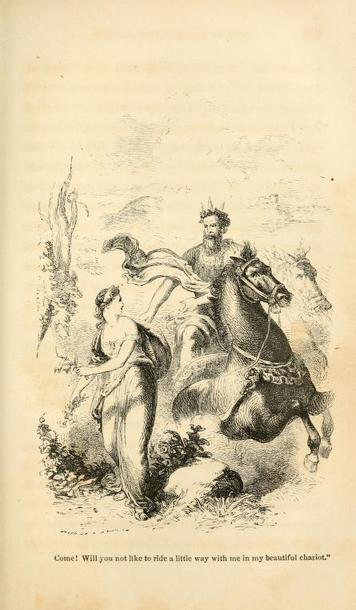
Tanglewood Tales, for Girls and Boys; Being a Second Wonder-Book. Boston: Ticknor, Reed, and Fields, 1853. [1st American edition]
But Proserpina was so alarmed, that she wished for nothing but to get out of his reach. And no wonder. The stranger did not look remarkably good-natured, in spite of his smile; and as for his voice, its tones were deep and stern, and sounded as much like the rumbling of an earthquake underground than anything else. As is always the case with children in trouble, Proserpina's first thought was to call for her mother.
"Mother, Mother Ceres!" cried she, all in a tremble. "Come quickly and save me."
But her voice was too faint for her mother to hear. Indeed, it is most probable that Ceres was then a thousand miles off, making the corn grow in some far distant country. Nor could it have availed her poor daughter, even had she been within hearing; for no sooner did Proserpina begin to cry out, than the stranger leaped to the ground, caught the child in his arms, and again mounted the chariot, shook the reins, and shouted to the four black horses to set off. They immediately broke into so swift a gallop, that it seemed rather like flying through the air than running along the earth. In a moment, Proserpina lost sight of the pleasant vale of Enna, in which she had always dwelt. Another instant, and even the summit of Mount Aetna had become so blue in the distance, that she could scarcely distinguish it from the smoke that gushed out of its crater. But still the poor child screamed, and scattered her apron full of flowers along the way, and left a long cry trailing behind the chariot; and many mothers, to whose ears it came, ran quickly to see if any mischief had befallen their children. But Mother Ceres was a great way off, and could not hear the cry.
As they rode on, the stranger did his best to soothe her.
"Why should you be so frightened, my pretty child?" said he, trying to soften his rough voice. "I promise not to do you any harm. What! you have been gathering flowers? Wait till we come to my palace, and I will give you a garden full of prettier flowers than those, all made of pearls, and diamonds, and rubies. Can you guess who I am? They call my name Pluto; and I am the king of diamonds and all other precious stones. Every atom of the gold and silver that lies under the earth belongs to me, to say nothing of the copper and iron, and of the coal mines, which supply me with abundance of fuel. Do you see this splendid crown upon my head? You may have it for a plaything. O, we shall be very good friends, and you will find me more agreeable than you expect, when once we get out of this troublesome sunshine."
"Let me go home!" cried Proserpina. "Let me go home!"
"My home is better than your mother's," answered King Pluto. "It is a palace, all made of gold, with crystal windows; and because there is little or no sunshine thereabouts, the apartments are illuminated with diamond lamps. You never saw anything half so magnificent as my throne. If you like, you may sit down on it, and be my little queen, and I will sit on the footstool."
"I don't care for golden palaces and thrones," sobbed Proserpina. "Oh, my mother, my mother! Carry me back to my mother!"




コメント 0